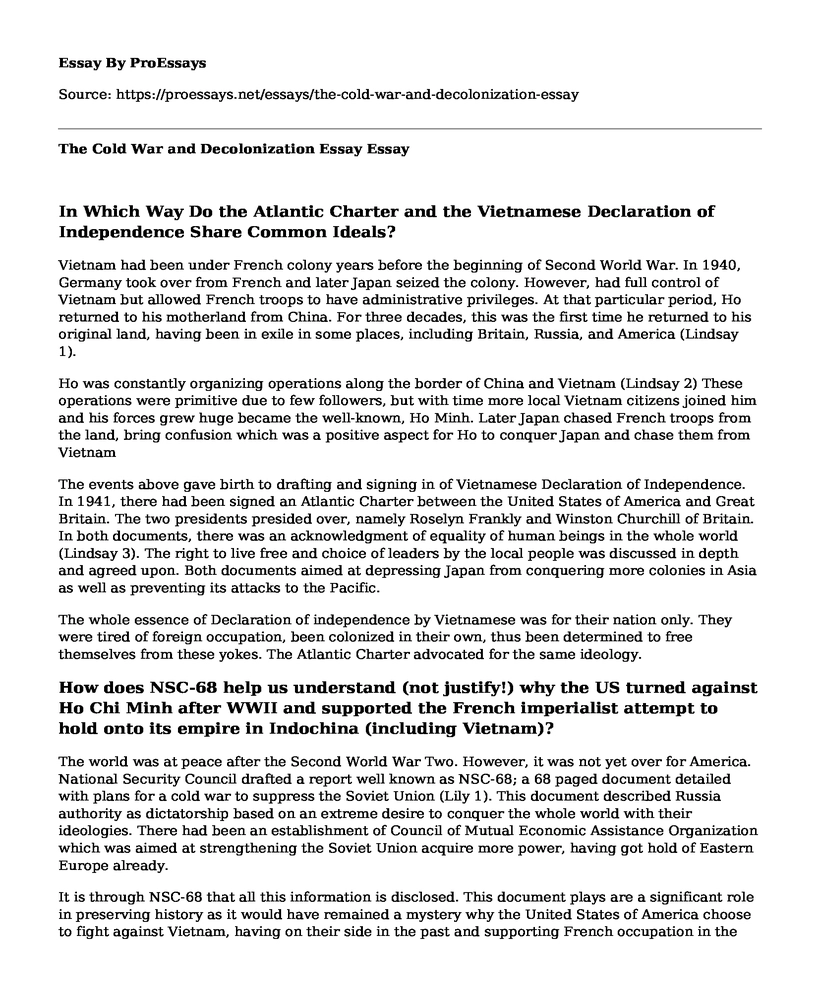In Which Way Do the Atlantic Charter and the Vietnamese Declaration of Independence Share Common Ideals?
Vietnam had been under French colony years before the beginning of Second World War. In 1940, Germany took over from French and later Japan seized the colony. However, had full control of Vietnam but allowed French troops to have administrative privileges. At that particular period, Ho returned to his motherland from China. For three decades, this was the first time he returned to his original land, having been in exile in some places, including Britain, Russia, and America (Lindsay 1).
Ho was constantly organizing operations along the border of China and Vietnam (Lindsay 2) These operations were primitive due to few followers, but with time more local Vietnam citizens joined him and his forces grew huge became the well-known, Ho Minh. Later Japan chased French troops from the land, bring confusion which was a positive aspect for Ho to conquer Japan and chase them from Vietnam
The events above gave birth to drafting and signing in of Vietnamese Declaration of Independence. In 1941, there had been signed an Atlantic Charter between the United States of America and Great Britain. The two presidents presided over, namely Roselyn Frankly and Winston Churchill of Britain. In both documents, there was an acknowledgment of equality of human beings in the whole world (Lindsay 3). The right to live free and choice of leaders by the local people was discussed in depth and agreed upon. Both documents aimed at depressing Japan from conquering more colonies in Asia as well as preventing its attacks to the Pacific.
The whole essence of Declaration of independence by Vietnamese was for their nation only. They were tired of foreign occupation, been colonized in their own, thus been determined to free themselves from these yokes. The Atlantic Charter advocated for the same ideology.
How does NSC-68 help us understand (not justify!) why the US turned against Ho Chi Minh after WWII and supported the French imperialist attempt to hold onto its empire in Indochina (including Vietnam)?
The world was at peace after the Second World War Two. However, it was not yet over for America. National Security Council drafted a report well known as NSC-68; a 68 paged document detailed with plans for a cold war to suppress the Soviet Union (Lily 1). This document described Russia authority as dictatorship based on an extreme desire to conquer the whole world with their ideologies. There had been an establishment of Council of Mutual Economic Assistance Organization which was aimed at strengthening the Soviet Union acquire more power, having got hold of Eastern Europe already.
It is through NSC-68 that all this information is disclosed. This document plays are a significant role in preserving history as it would have remained a mystery why the United States of America choose to fight against Vietnam, having on their side in the past and supporting French occupation in the land of Vietnam.
The Soviet Union had also launched an atomic bomb test in China. Before that, People's Republic of China had been formed already as well as Communist Germany Democratic Republic. It was foretold that in case of attacks, China would side with Soviet Union (Lily 2). This was a huge threat to the United States of America, and it had to look for a way out to suppress the Soviet Union. At this time, the Republic of Vietnam kept siding with the Soviet Union. This forced America to turn against them and support French, who had previously occupied the land of Vietnam.
Works Cited
Lily, Christina. "Why Did the United States Become Involved in Vietnam and Why Did We Lose the War? - Quora." Quora - A Place to Share Knowledge and Better Understand the World, 1 June 2017, www.quora.com/Why-did-the-United-States-become-involved-in-Vietnam-and-why-did-we-lose-the-war-1.
Lindsay, James. "Remembering Ho Chi Minh's 1945 Declaration of Vietnam's Independence." Council on Foreign Relations, 2 Sept. 2016, www.cfr.org/blog/remembering-ho-chi-minhs-1945-declaration-vietnams-independence.
Cite this page
The Cold War and Decolonization Essay. (2022, May 26). Retrieved from https://proessays.net/essays/the-cold-war-and-decolonization-essay
If you are the original author of this essay and no longer wish to have it published on the ProEssays website, please click below to request its removal:
- The Seven Years' War Paper Example
- Fracking and the Impacts Essay Example
- How the Great Depression Affected Families Essay Example
- Essay Sample on Theme of Slavery and Freedom in Works Written During the Antebellum Period
- Essay on Dunkirk: 400,000 Soldiers Trapped, Hope Evaporates
- Essay Example on U.S. Financial Crisis of 2007: A Post-Great Depression Regression
- Civil War as the First Modern War and How the War to Preserve the Union Became a War to End Slavery







